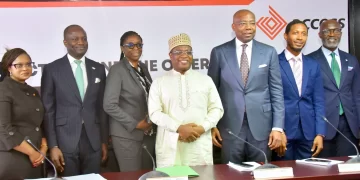The Central Bank of Nigeria (CBN) Governor, Yemi Cardoso, unveiled a groundbreaking Foreign Exchange (FX) Code in Abuja on Tuesday, signaling a decisive shift towards transparency, ethical conduct, and good governance in Nigeria’s FX market. Cardoso emphasized that the new code marks a departure from past practices that fostered inequality and undermined market integrity.
“This FX Code is not just a document; it is a blueprint for the future, grounded in the hard lessons of the past,” Cardoso stated at the launch event. “The era of multiple exchange rates, which benefited a select few at the expense of the vast majority of Nigerians, severely compromised market integrity. We must not forget the detrimental impact of such practices.”
The Governor cited the protracted verification of a $7 billion FX backlog, which took over 12 months, as a stark example of the unethical and illegal activities that plagued the previous system. He assured that the forensic verification process is nearing completion, and final settlements will be processed accordingly. Cardoso also condemned the damaging effects of unprecedented “ways-and-means” financing, which contributed significantly to inflation, currency depreciation, and a loss of public trust.
“The FX Code is a firm rejection of such distortions and an equally firm commitment to a future defined by fairness, trust, and market-driven principles,”1 Cardoso asserted. He warned that any individual or institution found to be in violation of the FX Code will face swift and decisive sanctions. The CBN, he added, will not tolerate any attempts to revert to the old, detrimental practices.
Cardoso highlighted the progress already made through ongoing market reforms. “The year 2024 has been marked by structural reforms aimed at returning the Naira to a freely determined market price and reducing volatility as several distortions were removed from the market,” he2 explained. Key reforms include the discontinuation of quasi-fiscal interventions, the unification of exchange rate windows, the clearing of foreign exchange commitments, and the recalibration of monetary policy tools. These measures, he emphasized, are crucial for restoring credibility to the FX market and allowing the CBN to focus on its core mandates.
A significant achievement, Cardoso noted, is the introduction of the Electronic Foreign Exchange Matching System (EFEMS) in December 2024. “The EFEMS has significantly improved market transparency and efficiency,” he said. “Since its launch, the Naira has appreciated considerably, from N1,663 on December 2, 2024, to N1,536 as of Monday.”
Omolara Duke, the CBN’s Director of Financial Markets Department, described the launch of the Nigerian FX Code as a landmark achievement. “It is a reflection of the heart and soul put into shaping the future of the Nigerian foreign exchange market,” she said. Duke explained that the CBN’s driving force in developing the code was the belief that “Nigeria deserves a foreign exchange market that is ethical, transparent, and resilient.” She added, “We worked relentlessly to promote an FX market that serves everyone fairly and inspires confidence both at home and abroad.”3
Duke outlined the six core principles underpinning the FX Code: ethics, governance, execution, information sharing, risk management, and settlement processes. “These principles represent our collective commitment to a foreign exchange market that reflects our highest aspirations for Nigeria’s financial future,”4 she stated.
Jim Ovia, Chairman of Zenith Bank Plc, lauded the initiative, calling the FX Code a “blessing” for the banking industry. He predicted that it would unlock new opportunities for Nigeria and the banking sector, fostering growth and stability.
Credit: NAN (Text Excluding Headline)






















